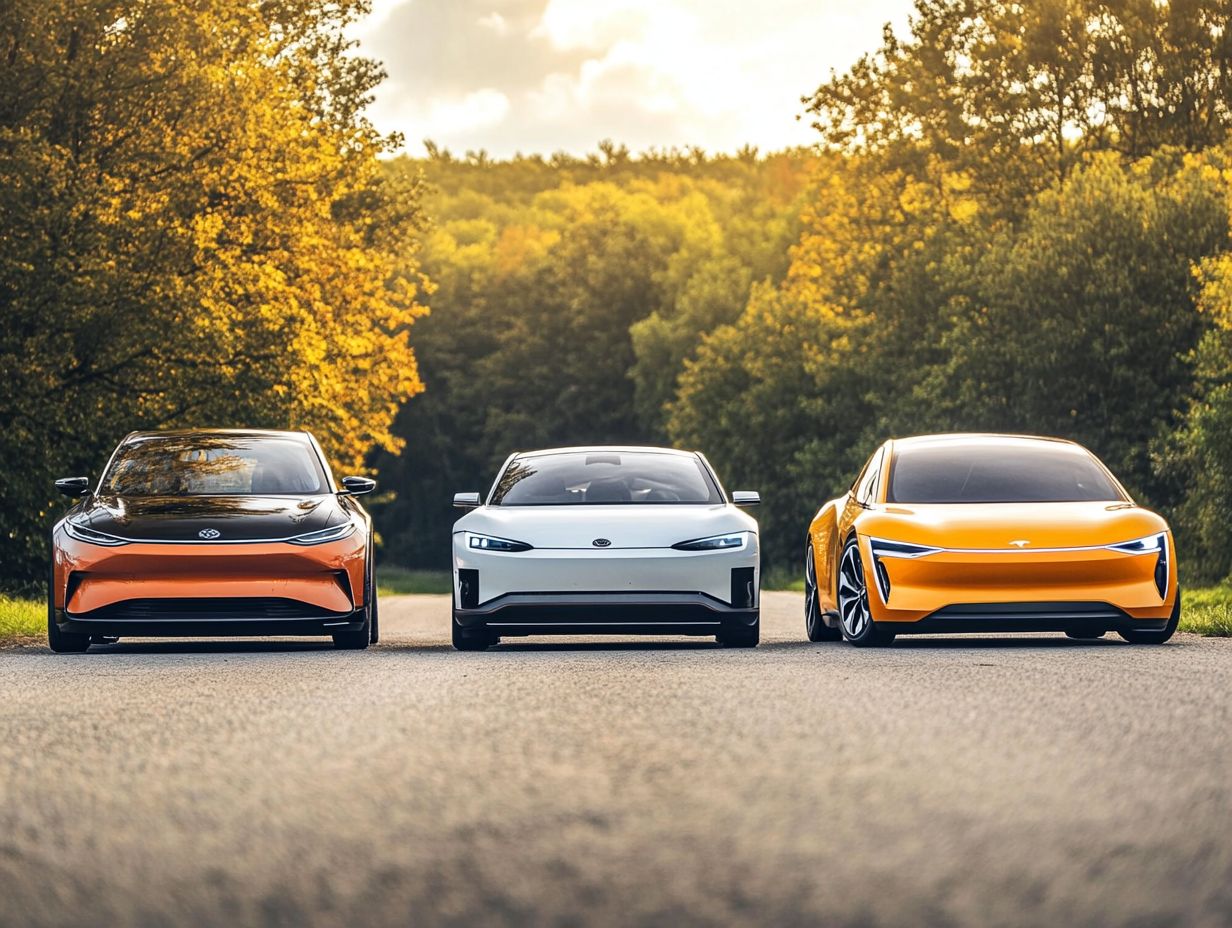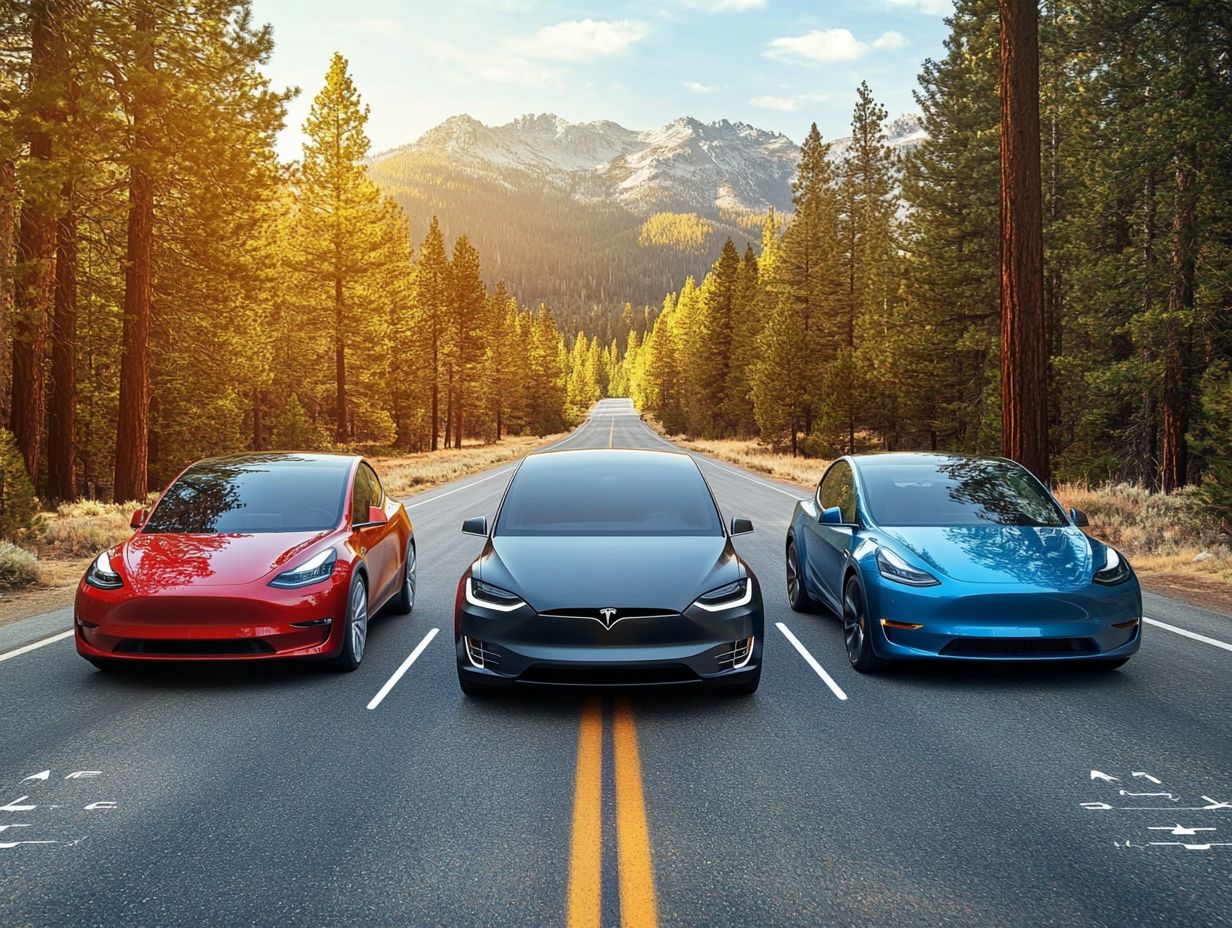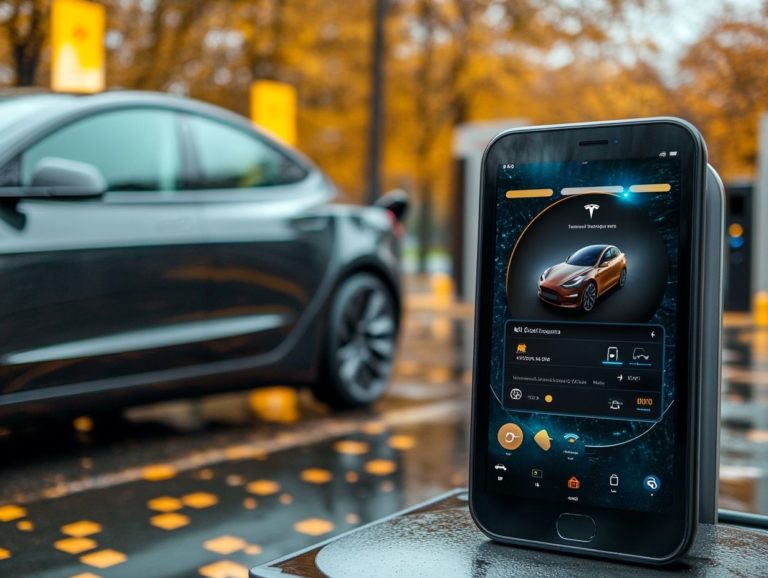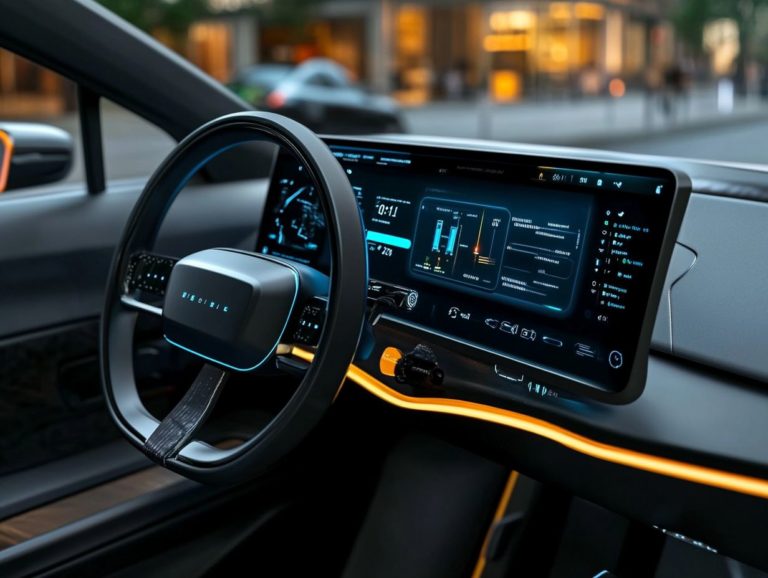how to compare different ev models?
As the electric vehicle (EV) market expands, selecting the perfect model can seem daunting. With a variety of EVs on the market, grasping the key features that differentiate them is essential for your decision.
This article will help you compare critical factors, such as battery range, charging options, and affordability, to empower you to make an informed choice. It also addresses the environmental implications of your selection and outlines available incentives, ensuring that you not only choose the right vehicle but also optimize your investment.
Contents
- Key Takeaways:
- Understanding EV Models
- Comparison Factors
- Frequently Asked Questions
- What factors should I consider when comparing different EV models?
- How do I determine the range of an EV model?
- Is it more expensive to maintain an EV compared to a traditional vehicle?
- What are the available charging options for different EV models?
- Can I test drive different EV models before making a decision?
- Are there any incentives or tax breaks for purchasing an EV?
Key Takeaways:

Understanding EV Models
Understanding EV models is crucial for you, whether you’re a consumer or an industry player, especially as the electric vehicle market rapidly evolves in response to the rising need for eco-friendly transportation.
This segment explores key categories like Battery Electric Vehicles (BEVs), which are fully electric cars, and Plug-in Hybrid Electric Vehicles (PHEVs), which use both gas and electricity. We showcase their distinct attributes and roles in reducing carbon footprints and emissions.
By diving into the nuances of various EV models, you’ll discover the best options for you that align with your performance needs while also considering your environmental impact. Additionally, learning how to compare electric vehicle ownership costs can further aid in making an informed decision.
Types of Electric Vehicles
Electric vehicles can be primarily categorized into two main types: Battery Electric Vehicles (BEVs) and Plug-in Hybrid Electric Vehicles (PHEVs). Each presents unique advantages and limitations for you to consider.
BEVs run entirely on electric power, making them zero-emission and perfect for urban environments where short commutes are the norm. Thanks to advancements in battery technology, many of these vehicles now boast impressive ranges, often exceeding 300 miles on a single charge ideal for your daily needs.
On the other hand, PHEVs seamlessly blend traditional internal combustion engines with electric power, offering you flexibility for longer trips without the range anxiety that can accompany fully electric options.
Current trends indicate a growing focus on enhancing battery efficiency and reducing charging times, suggesting that both BEVs and PHEVs are increasingly accessible for a broader audience.
Moreover, innovations in solid-state batteries promise not only improved performance but also enhanced safety, pushing the boundaries of what electric mobility can achieve for you.
Key Features to Consider
When selecting from the array of electric vehicle models available, you should carefully consider several key features, such as performance indicators, battery efficiency, and maintenance costs.
Evaluating the driving range of each model is crucial. A longer driving range can significantly alleviate any anxiety related to charging. The charging infrastructure in your area is important. Easy access to stations makes owning an EV more convenient.
Don’t overlook the vehicle’s weight, either, as it directly influences both efficiency and handling. By understanding how these features impact overall ownership costs, you’ll empower yourself to make a more informed decision and ultimately enjoy a more rewarding ownership experience.
Comparison Factors

When you compare electric vehicles, several key factors come into play that significantly influence your overall experience and the sustainability benefits you can enjoy, including what are the most common EV models.
Cost of ownership, charging options, and performance range are essential elements to consider. Each of these aspects can dramatically shape your decision-making process and ultimately determine how well an electric vehicle fits into your lifestyle.
Don’t miss out on the chance to drive the future of transportation!
Battery Range and Performance
Battery range and performance are crucial in determining whether an electric vehicle meets your needs. These factors influence essential performance indicators and address common concerns, such as the worry of running out of battery while driving.
These factors become even more significant when you consider various driving conditions, from the stop-and-go hustle of city traffic to long, open stretches on the highway.
For daily commuters, a vehicle with a robust battery range offers peace of mind for routine trips, reducing worries about running out of charge. Long-distance travelers face their own challenges, where fluctuating range and the availability of charging stations can greatly affect their journeys.
To ease these concerns, manufacturers are increasingly incorporating advanced technologies and features, such as real-time range estimates and extensive charging networks. This creates a more reassuring experience, whether you’re navigating your daily commute or embarking on a weekend getaway.
Charging Options and Time
The variety of charging options and the time required for each are essential factors to ensure a seamless charging experience with your electric vehicle.
Home charging setups are the most convenient choice for daily use. They allow you to plug in your vehicle overnight, so you don t have to worry about visiting a charging station during your hectic days.
Public charging stations provide flexibility, especially during long road trips. However, you might encounter longer wait times based on location and availability.
Understanding how these choices interact can greatly influence your overall ownership experience. A well-balanced mix of home and public charging solutions boosts convenience and caters to unique driving habits, making electric vehicle ownership more accessible and enjoyable.
Cost and Affordability
Cost and affordability are paramount considerations when contemplating the purchase of an electric vehicle. This includes the initial purchase price, ongoing ownership costs, and available incentives like the federal tax credit.
Additionally, assess maintenance expenses, which tend to be lower for electric vehicles due to fewer moving parts and less wear on the brakes. Insurance rates, charging infrastructure availability, and projected energy costs significantly impact the total cost of ownership. By understanding these elements, you empower yourself to make informed decisions.
Explore local incentives like rebates or grants to discover additional savings that enhance the overall value of choosing an electric vehicle.
Additional Considerations

Beyond the primary features of electric vehicles, consider several additional factors that can greatly influence your decision. These include the environmental impact, relevant case studies, and the brand’s reputation. Each element plays a crucial role in shaping your choices and understanding the broader implications of your purchase.
Environmental Impact
The environmental impact of electric vehicles is a vital consideration that highlights their effectiveness in reducing emissions and tackling climate change. While the manufacturing process of EVs can lead to higher initial emissions, their operation more than compensates for that carbon footprint.
Research from the Union of Concerned Scientists reveals that over their lifespan, electric vehicles can produce approximately 50% fewer greenhouse gas emissions compared to conventional gasoline-powered cars. This impressive reduction is due to their efficiency; EVs convert over 77% of electrical energy from the grid to power at the wheels, while gasoline vehicles manage only about 12-30% of the energy stored in gasoline.
As renewable energy sources continue to expand and grid infrastructures shift towards cleaner energy, the environmental advantages of electric vehicles are set to increase even further.
Available Incentives and Rebates
Various incentives and rebates, such as the federal tax credit, can significantly influence the overall cost of owning an electric vehicle. This makes switching to electric more appealing.
State and local governments often roll out their own programs. These money-saving options might include cash rebates, reduced registration fees, and exemptions from sales tax. All of these contribute to lowering that initial purchase price.
By easing the burden of upfront costs, these incentives encourage you to consider electric vehicles. They also empower you to make a more informed decision if you’re already interested.
They strengthen the case for electric vehicle ownership, making it an exciting choice for everyone!
Brand Reputation and Customer Reviews
Brand reputation is a crucial factor in guiding your consumer choices. Customer reviews and consumer reports offer invaluable insights into the reliability and performance of electric vehicle manufacturers.
Take established brands like Tesla and Nissan as examples. They often dominate the conversation thanks to their long-standing presence and innovative strides in the electric vehicle market.
Consumers frequently mention key factors such as vehicle range, charging stations, and customer service as essential elements in their buying decisions. Positive feedback from satisfied users enhances the perception of these brands and bolsters overall confidence in the electric vehicle purchasing experience.
Conversely, newcomers to the industry may face challenges as they strive to establish trust through consistent performance ratings and favorable user experiences.
As you and other buyers become increasingly discerning, the significance of brand reputation in shaping your purchasing decisions becomes ever more apparent.
Frequently Asked Questions

In this section, we address some of the most common questions about electric vehicles to help you make a well-informed choice.
What factors should I consider when comparing different EV models?
Some important factors to consider when comparing EV models include price, range, battery size, charging time, warranty, and available features. To make an informed decision, learn how to effectively compare EV prices online and assess your personal driving needs and habits to determine which features are most important to you.
How do I determine the range of an EV model?
The range of an EV model refers to the distance it can travel on a single charge. This is influenced by factors such as battery size, driving conditions, and weather. Most EV manufacturers provide an estimated range for their models, but keep in mind that this may vary in real-world driving scenarios.
Is it more expensive to maintain an EV compared to a traditional vehicle?
Generally, EVs have lower maintenance costs compared to traditional vehicles because they have fewer moving parts. However, depending on the model and battery type, there may be additional costs for battery replacement down the line. It s important to research and consider these potential costs when comparing EV models.
What are the available charging options for different EV models?
Most EV models can be charged using a standard household outlet, but this may take longer. Other options include Level 2 charging stations, which can charge the vehicle faster, and DC fast charging, which can provide a significant amount of charge in a short time. It’s essential to note that not all EV models are compatible with all types of charging stations.
Can I test drive different EV models before making a decision?
Many dealerships and EV manufacturers offer test drives for potential buyers. This is a great way to get a feel for the vehicle and its features before making a decision. We recommend test driving multiple models to better understand the differences and find the right fit for you.
Are there any incentives or tax breaks for purchasing an EV?
Yes, there are often incentives and tax breaks available for purchasing an EV. These can vary depending on your location and the specific model you are considering. It’s essential to research and factor in these potential savings when comparing different EV models.
For the latest information on incentives and EV options, consult local dealers or websites. Empower yourself with knowledge!






